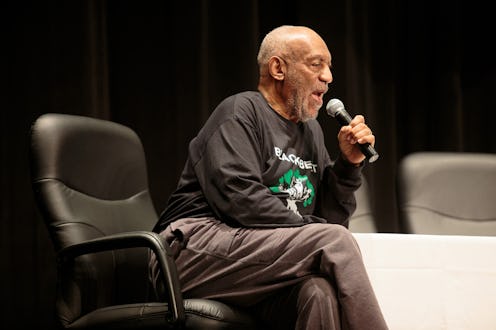News
Horrible New Details On The Bill Cosby Deposition
On Saturday, the nation's foremost newspaper of record published an article which may end up being the final word on a thoroughly disgraced American icon, and it's set the Internet ablaze — The New York Times' Bill Cosby deposition story is, simply put, the final nail in the coffin for his image.
Back in 2005, Cosby was in the midst of a lawsuit by a former Temple University basketball manager named Andrea Constand, who alleged that the former TV star had drugged and raped her. It's a story that now sounds grimly familiar — Cosby has been accused of similar crimes by a staggering number of women to date, over 40 in all. For many people, the sheer volume of claims against him and the tightly similar, central themes of these women's stories have already set public opinion in stone. Even President Obama has weighed in, affirming that the kind of behavior Cosby's been accused of is undeniably rape.
But, over the course of the four-hour deposition, described in vivid detail by the Times, Cosby revealed more about his lifestyle — and in doing so, shone more light on the dozens of allegations — than anything he's said since they exploded into the national spotlight last year.
Make no mistake, the contents of the deposition would be shocking and unnerving for people to learn, even if Cosby hadn't been accused of rape dozens of times over. His admissions of a life chock full of cover-ups and extramarital sex would've cut sharply against his late-career turn as a moralizing, patronizing arbiter of respectability politics. It's a late-career turn which rankled a lot of people, long before his name became synonymous with a culture of disbelieving women. But nowadays, taken in full context, it's kind of beyond words. Here are some of the shocking lowlights:
He Inquired About A Young Woman's Dead Father As A Means To Get Sex
One of Cosby's means of getting close to women was revealed about his pursuit of Beth Ferrier, a model in the 1980s, and one of the women who's since publicly accused Cosby of drugging her. Cosby stated in the deposition that he'd spoken to Ferrier about her father, who had died of cancer, and expressed interest in her career, because he'd wanted to have sex with her. From the Times story:
“Did you ask her those questions because you wanted to have sexual contact with her?” Ms. Troiani, the plaintiff's lawyer, asked. “Yes,” Mr. Cosby responded.
He's Not Clear About Sexual Consent While On Drugs
Cosby maintains in the deposition that he never drugged Constand with anything but Benadryl, which he gave her to "relieve stress." But he was also open about his use of Quaaludes in the 1970s, heavy sedatives which he'd give to women "the same as a person would say have a drink."
This is obviously chilling in the context of the accusations against him — the vast majority center around Cosby secretly drugging women, whether with pills or drinks, before sexually abusing them. He denied this in 2005, although there's one particularly telling tidbit: When asked whether Therese Serignese could have given sexual consent while she on Quaaludes, Cosby replied, "I don't know." Serignese has also publicly accused Cosby, and is currently suing him for defamation.
He Thought His Sex With Constand Was Consensual Because He's A "Pretty Decent Reader Of People"
When discussing the moments after a sexual encounter with Constand, Cosby explained how her behavior made him think it was consensual. This is noteworthy for an obvious reason — consent is something you're supposed to be sure of before you have sex, not something you're trying to assess afterwards. Here are Cosby's words:
I walk her out. She does not look angry. She does not say to me, don’t ever do that again. She doesn't walk out with an attitude of a huff, because I think that I'm a pretty decent reader of people and their emotions in these romantic sexual things, whatever you want to call them.
He Routed Payouts Through His Agency To Hide His Behavior From His Wife
Cosby admitted to paying $5,000 to Serignese — who alleges she was drugged and raped by him in Las Vegas in 1976 — but not personally. Instead, in what he described as an effort to hide his behavior from his wife Camille, he says he had his agency (William Morris) pay out the money, and later paid them back. The exchange, as per The New York Times' excerpts:
Q. I have to finish my question. Was [the purpose of that] to disguise that you were paying the money to Theresa?
A. Yes.
Q. And the reason you were doing — who were you preventing from knowing that?
A. Mrs. Cosby.
Image: Getty Images (4)
